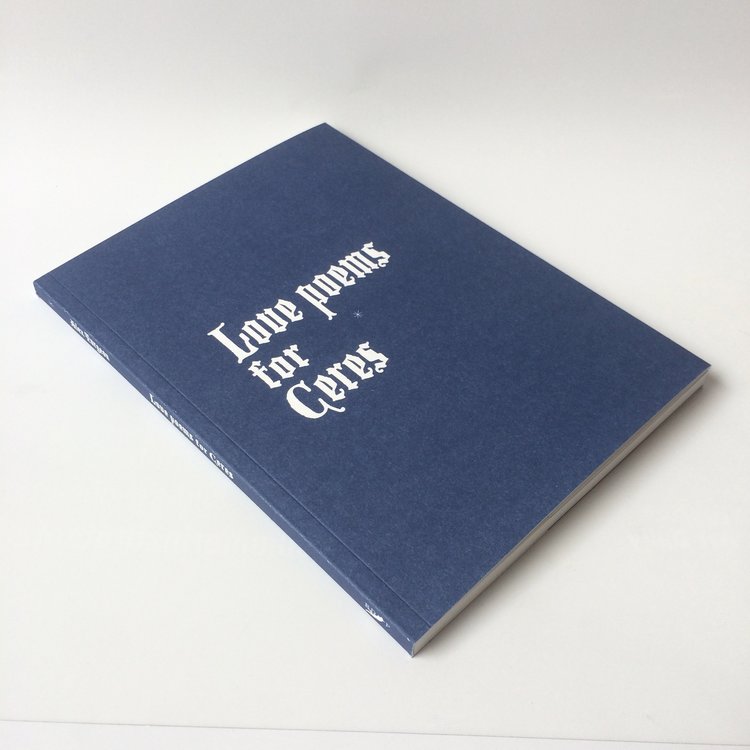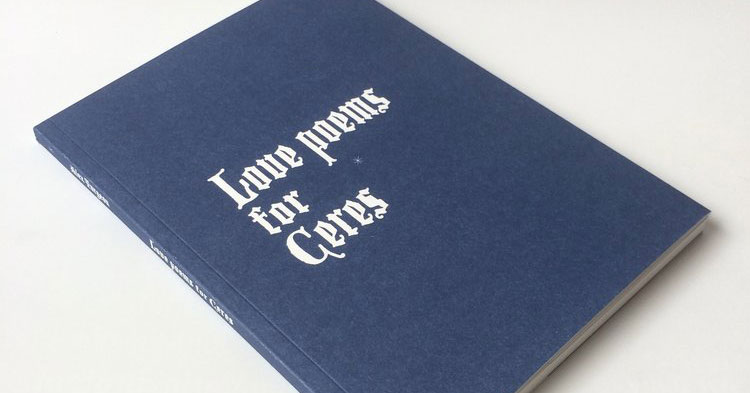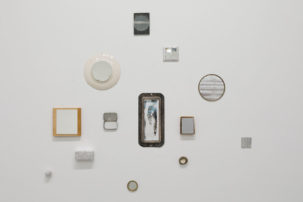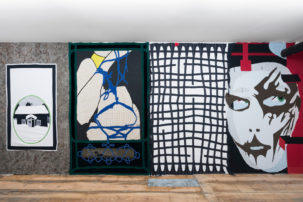 Alex Turgeon, Love Poems for Ceres, published in 2017 by Broken Dimanche Press.
Alex Turgeon, Love Poems for Ceres, published in 2017 by Broken Dimanche Press.
First, the embarrassing part. During my third read of Alex Turgeon’s book Love Poems for Ceres, I started looking up terms. The book’s nomenclature had pulled my hetero lexicon out of its depth. Rough trade, ambrosia stains, Muscle Mary: these are just three examples from a multitude of appellations and personages hailing from gay cultures and arcane mythologies. There’s also Magna Mater, an ancient goddess of nature whose name might suggest—to a drowsy reader—molten rock. Turgeon must have anticipated this likely misreading; in 12 inventively structured poems punctuated by drawings, this volume conscripts linguistic trickery to unsettle language and its defining of cultural, social and sexual surrounds.
Since August 2016, a few snapshots of Turgeon have sat dormant on my computer; they are of him performing at Berlin’s Center, which had put on a show of his sculptures. With a microphone buried in his mouth, Turgeon, in these images, paces behind a glass wall, struggling to read aloud. Here is a person gagged not by metal and copper, by the microphone as phallic emblem, or by the meaning produced by that sign—use your voice, and use it loudly. That mic is akin to the nouns in this book: arranged into new couplings, estranged from their familiar associations, they refer to alternate dimensions spanning gayness and godliness (and gay gods, too).
Now, this blue-indigo paperback—published by Broken Dimanche Press—reads like a keystone to those images of Turgeon’s performance. The poem “Magna Matters” displaces the architectonic sureness of writing with a freedom to shape-shift. Sometimes, we find regular, justified stanzas. But on the next page, phrases descend like ziggurat steps. And then on the next, the words shift back and forth like deadbolt guts—an association aided by a nearby drawing, wherein a keyhole puffs smoke. Readers will spend a lot of time in such holes. And their Freudian inflection might be annoying were it not for the book’s tone: neither pretentiously psychoanalytical nor desperately vulgar, but instead gracefully and searchingly absurd.
Soon, Turgeon brings us “down / down / down / down / down / down the termite hole, / to eat away / at an organic green mile…” These nouns seem familiar until you notice that this termite hole is not a product of hungry insects, but a conduit through which eating will begin, and through which a question of voice is raised. Who is this eater, anyway? Whatever the case, previous lines have already begun to mutate the hole’s meaning, with holes punctured along “Orion’s belt / leaving each orifice / smouldering like / key hole / of tire fire…” Weirdly, as these nouns destabilize one another, the English language is returned to its essence: a constructed code whose meanings, being already contingent on agreed usage, can be rejigged in service to heterodox visions.
The other day, I was reading Turgeon’s book in a hotel breakfast room, when a muscled twentyish man sat down. His T-shirt read “REVENGE.” At first, this oppressive text seemed to contrast with the ungrounded textual archipelagos in the poems I was reading. But soon, an unexpected resonance emerged between shirt and book. The taking of revenge is a classic hetero-masculine fantasy. On several occasions, Turgeon’s book inhabits sites of masculine make believe; but always in a way that’s awry, that melts the normative solidity of these places. The book’s opening piece ends thusly: “I am Frankenstein at the rodeo!” What kind of Frankenstein would announce themselves at a rodeo? Rodeos are notoriously conservative assemblies not known for hospitality to strangers (unless, that is, events organized by the Gay Rodeo Association). As a reader looks for signs that might clarify this point, Mary Shelley’s monster adopts a carnival barker’s voice, crashing the cowpoke party with a paean to edification: “Here ye! Here ye! / The time has come to talk of many things, / While all laid bare is seemingly forgot / Of grave unearth a corpse of hot line rings…”
These scenes have a gothic sci-fi atmosphere which lands Turgeon in the company of other artist-poets—Jesse Darling, for example—who likewise embrace the imaginative, counter-orthodox capacities of genre writing. In the book’s title piece, we are bucked into the firmament where lives Ceres: dwarf planet, Roman goddess of agriculture, and object of the writer’s adoration. Visually, this is Turgeon’s most abstract poem; in timbre, its softest. Across 20 pages, constellatory words depict yearning and visualize the goddess planet through cryptic but vivid descriptions. Again we again enter the artist’s mouth, and into “A separate space between this palpable shape that lays on the inside / my mouth / weighted in lead / of inverted taste / and the / everything of pure nothings which roll off my / tongue,…” Before reading the word “roll,” we don’t know that the “shape” is round. This willingness let a late verb describe shape—instead deferring to easier adjectives—emblematizes the patient elusiveness of Turgeon’s poetics.
If this artist is searching for galactic love, his desire is connected to earthly circumstance. He writes “at arms length from / this shit can tin / that can turn quickly into… glitter…balls for fairy lights / refracting faggot iridescents” and from “a space between / a rock and a hot place / a rock and a no place / or a no place like home base.” This “no place like home base” seems to weft unconsecrated lust with an absence, haunting the sport of baseball itself. Like rodeos, baseball fields are a realm of hard-bitten, tobacco-chewing, American mythology. In the popular imagination, they are also erotically charged hetero-masculine spaces. And those “faggot iridescents” become synonymous both with stars—which could signify the souls of innocents murdered on faggot fires—and with twinkling stadium lights redolent of conservative Americana, bound up with a culture of compulsory heterosexuality. Turgeon’s achievement here is to draw these links without drawing conclusions.
To pine for planets or gods is to gaze upward, and Turgeon literalizes this perspective with a supple pencil rendering of the dwarf planet Ceres that is crossed by a white grid, suggesting a window. While the poems’ inventive structures model the changeability of language, stylistic shifts in the drawings sometimes risk draining the work of momentum; both a phantasmagorical rendering of a cave in a man’s anus and a sketch of an Edwardian gent peering through a fence knot trade subtle shading for illustrative lines. Still, the drawings are always alive. More to the point, their language of suggestive apertures and straightforward orifices lends the drifting book a visual and carnal baseline.
Often, these poems overwhelm. But this seems by design. They are rigorously faithful to the imaginative and physical labyrinths of subjectivity—not the fetishized consumer individual, but the subject as part of a collective body immersed in shared galaxies of signifier and archetype. This is not to suggest that Love Poems for Ceres contains even a trace of holistic bromide. Turgeon’s gods and monsters echo those that live in our imaginations—gods and monsters that, when we’re not careful, are easily projected onto others. Meanwhile, his antique phrasings register a persistent, subconscious link to olden times, olden prejudices, olden fantasies and olden myths. Somehow, in transcribing all of this, the book retains fun. Pleasure is not sacrificed to the gods of critique, here. On the contrary, the two are formidably joined.
Mitch Speed is an artist and writer based in Berlin.

 Alex Turgeon,Love Poems for Ceres , published in 2017 by Broken Dimanche Press.
Alex Turgeon,Love Poems for Ceres , published in 2017 by Broken Dimanche Press.







